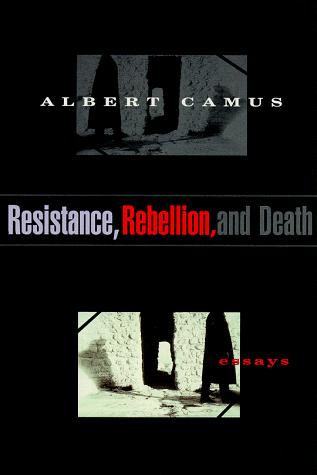Utsob Roy reviewed Resistance, rebellion, and death by Albert Camus
Review of 'Resistance, rebellion, and death' on 'Goodreads'
5 stars
This Camus is very different than the one I encountered by far. This book contains articles on pacifism, law, and politics (and of course the subjects mentioned in the title) and deals with all of humanity. In this respect, it is not 'personal' like his philosophical works like The Myth of Sisyphus or novels like The Stranger.
I was never convinced with the logic (or the lack of it) he provided in The Myth of Sisyphus. Rolling the stone again and again for some vague sense of duty or honour... in the personal arena, it doesn't make much sense. This sense is an ineffective antidote to nihilism in my opinion. It only makes sense if we apply this in a social arena. Where our urge to build and defend a just society will make the world bearable for many. This, accompanied by love for humanity and everything beautiful is a better antidote to the nihilism.
In his word:
You never believed in the meaning of this world, and you therefore deduced the idea that everything was equivalent and that good and evil could be defined according to one’s wishes. You supposed that in the absence of any human or divine code the only values were those of the animal world—in other words, violence and cunning. Hence you concluded that man was negligible and that his soul could be killed, that in the maddest of histories the only pursuit for the individual was the adventure of power and his only morality, the realism of conquests. And, to tell the truth, I, believing I thought as you did, saw no valid argument to answer you except a fierce love of justice which, after all, seemed to me as unreasonable as the most sudden passion.
Where lay the difference? Simply that you readily accepted despair and I never yielded to it. Simply that you saw the injustice of our condition to the point of being willing to add to it, whereas it seemed to me that man must exalt justice in order to fight against eternal injustice, create happiness in order to protest against the universe of unhappiness. Because you turned your despair into intoxication, because you freed yourself from it by making a principle of it, you were willing to destroy man’s works and to fight him in order to add to his basic misery. Meanwhile, refusing to accept that despair and that tortured world, I merely wanted men to rediscover their solidarity in order to wage war against their revolting fate.
One of the key points of this book is, Nothing is more important than liberty. Liberty should come as a whole, un-compromisable, untradable with anything, be it even bread. If you tread liberty with anything, one day even that thing can be taken away from you, you who have no liberty, therefore no right to speak. If authority suppresses the press, if they want to take away your liberty and give you other commodities, well... distrust them, refuse them.
Camus also made a compelling case against the death penalty, and the mechanism on ant-intellectually nurtured by totalitarian governments.
A very good read indeed!

